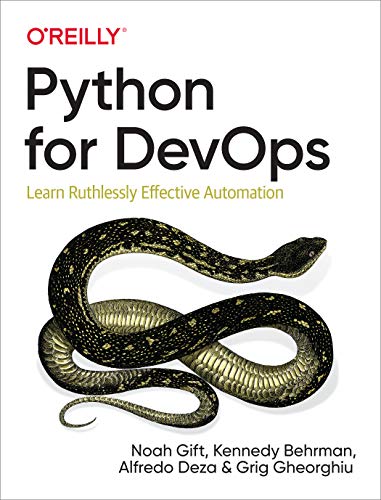Python for DevOps: Learn Ruthlessly Effective Automation Link to heading
Summary Link to heading
“Python for DevOps: Learn Ruthlessly Effective Automation” is a comprehensive guide that explores how Python programming can be effectively used to automate various aspects of DevOps processes. The book is co-authored by Kennedy Behrman, Alfredo Deza, Noah Gift, and Grig Gheorghiu. It delves into leveraging Python to streamline tasks such as configuration management, monitoring, building requirements and deployment scripts, and testing. The authors focus on practical applications of Python in the DevOps lifecycle, offering readers insight into real-world scenarios and examples. The book serves as both a tutorial and a reference for those looking to integrate Python into their DevOps workflow.
Review Link to heading
“Python for DevOps” is praised for its clear, concise explanations and practical approach to automation in the context of DevOps. The collaborative effort of the authors, each bringing a wealth of experience, ensures the book is rich with real-world perspectives. One of the book’s notable strengths is its ability to cater to professionals from different backgrounds, whether they are newcomers to DevOps or seasoned practitioners. However, some readers might find the pace challenging if they are not familiar with Python. Overall, the book is considered an invaluable resource for enhancing productivity and efficiency through automation.
Key Takeaways Link to heading
- Python in DevOps: Python is a versatile tool for automating various DevOps tasks and can greatly enhance efficiency.
- Automation Techniques: The book covers a wide array of automation techniques applicable across different stages of DevOps.
- Real-World Examples: The authors provide practical examples and scenarios to illustrate the concepts discussed.
- Skill Enhancement: Learning Python for automation can bridge gaps between development and operations teams.
- Flexibility and Integration: Python’s ability to integrate with existing tools makes it a powerful asset in DevOps environments.
Recommendation Link to heading
This book is highly recommended for DevOps professionals, software engineers, and IT operations specialists aiming to improve their automation skills using Python. It is particularly beneficial for those looking to enhance their workflows by implementing effective and efficient automation solutions. Additionally, developers interested in bridging the gap between development and operations will find this book to be a valuable resource.
